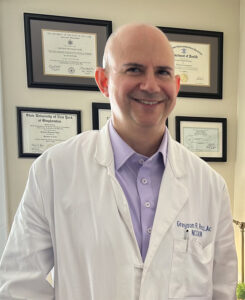By Barbara Pierce

Acupuncture has become one of the most utilized forms of integrative medicine interventions in the U.S. It’s become popular for its effectiveness to relieve pain, and also because scientific studies have proven its success.
Nearly 30 years ago, the National Institutes of Health formally acknowledged the value of acupuncture in relieving pain, after mounting evidence from clinical trials. Studies have showed that acupuncture is an effective treatment, alone or in combination with conventional therapies.
We asked board-certified acupuncturist Greyson Ross, owner and operator of Greyson Ross Acupuncture in New Hartford, to explain more about acupuncture.
How does acupuncture work?
“It’s a non-invasive way to impact the nervous system and the circulatory system,” said Ross. “The acupuncturist inserts very thin needles at strategic points in the body, which causes a huge blood flow to that area right away.”
Acupuncture works with the body’s ability to heal itself. When we have a pain or an injury, that tells the brain to increase blood flow and other healing cells of our body to that area. In response, blood flow and other healing cells immediately rush to the site to reduce the pain and promote healing. When a small injury is created with the needles, the body responds by sending healing blood flow and other healing cells to the site.
The needles stimulate the immune system, reduce inflammation, decrease overactive pain receptors. The needles also stimulate the nervous system and tweak the nervous system to result in a relaxation response, which also helps to relieve pain by supporting the body to shift from flight or fight to rest and repair.
Is it painful?
“People don’t understand acupuncture,” said Ross. “Many are afraid of it. They’re afraid of the needles. But the needles are very thin, the size of a human hair. I can get 14 of these needles on the tip of a hypodermic needle. (A hypodermic needle is the needle that is commonly used to draw blood or insert substances into your body.)
The needles are solid, flexible and disposable. People usually feel a dull ache, a sensation of pressure or a tingling when the needles are inserted; it’s not painful as the needles are so tiny.
What is it most helpful for?
Pain is probably the reason most people seek acupuncture — back pain, shoulder pain, neck pain, the pain of arthritis, cancer, etc. Acute pain or chronic pain responds to acupuncture.
Pain that lasts more than three months is considered chronic pain. When pain becomes chronic, the nervous system can become stuck in a pain mode, with signals sent to the brain that things are bad. The brain is altered by the pain. Unraveling or changing this pain response is difficult and complicated.
Acupuncture is able to unravel the pain response by regulating the pain signals that are going to the brain; it resets them, Ross explained. It resets your nervous system as it was prior to the injury.
Eighty-three-year-old Donald Kozlowski, of Bradenton, Florida, sought help from an acupuncturist for chronic neck pain since an injury a year ago. He tried several other traditional and non traditional healing methods, with no success. After just a few acupuncture sessions, his pain was much improved. His depression and anxiety lifted. He continues to go for treatments biweekly.
He describes it this way: “The acupuncture helps takes away the tension I felt all the time. It relaxes my nervous system. I feel so good after I see her; I’m in a much better mood. I don’t feel it when she puts the needles in as they’re very sharp.”
“I’m not sure if it’s the solution for everyone, but it’s sure worked well for me,” he continued. “It’ll be different for everyone. Try it; it’s better than taking pain medication.”
A large number of disease conditions can be successfully treated by acupuncture, such as addiction, autoimmune disorders, sinusitis, carpal tunnel syndrome, depression, insomnia, PMS, infertility, COVID-19 and many other conditions.
Acupuncture has been proven to lower stress hormones. Dealing with continuing stress is a problem many of us deal with, said Ross. We’re all in a chronic ‘fight or flight’ mode. Acupuncture takes us to a state of relaxation. It evens out our mood, reduces anxiety, and improves overall well-being.
How many treatments do you need for results?
How many treatments you will need depends on several things, including how long you have had your issue, Ross said. Depending on the condition or injury, you might get relief with just one or two sessions. Acute things need only one or two sessions. Chronic conditions that you’ve had a while, like arthritis, autoimmune disorder or back pain, can take several sessions before you feel relief.
“If you’re not sure acupuncture is right for you, call me and we can discuss it,” Ross said.

